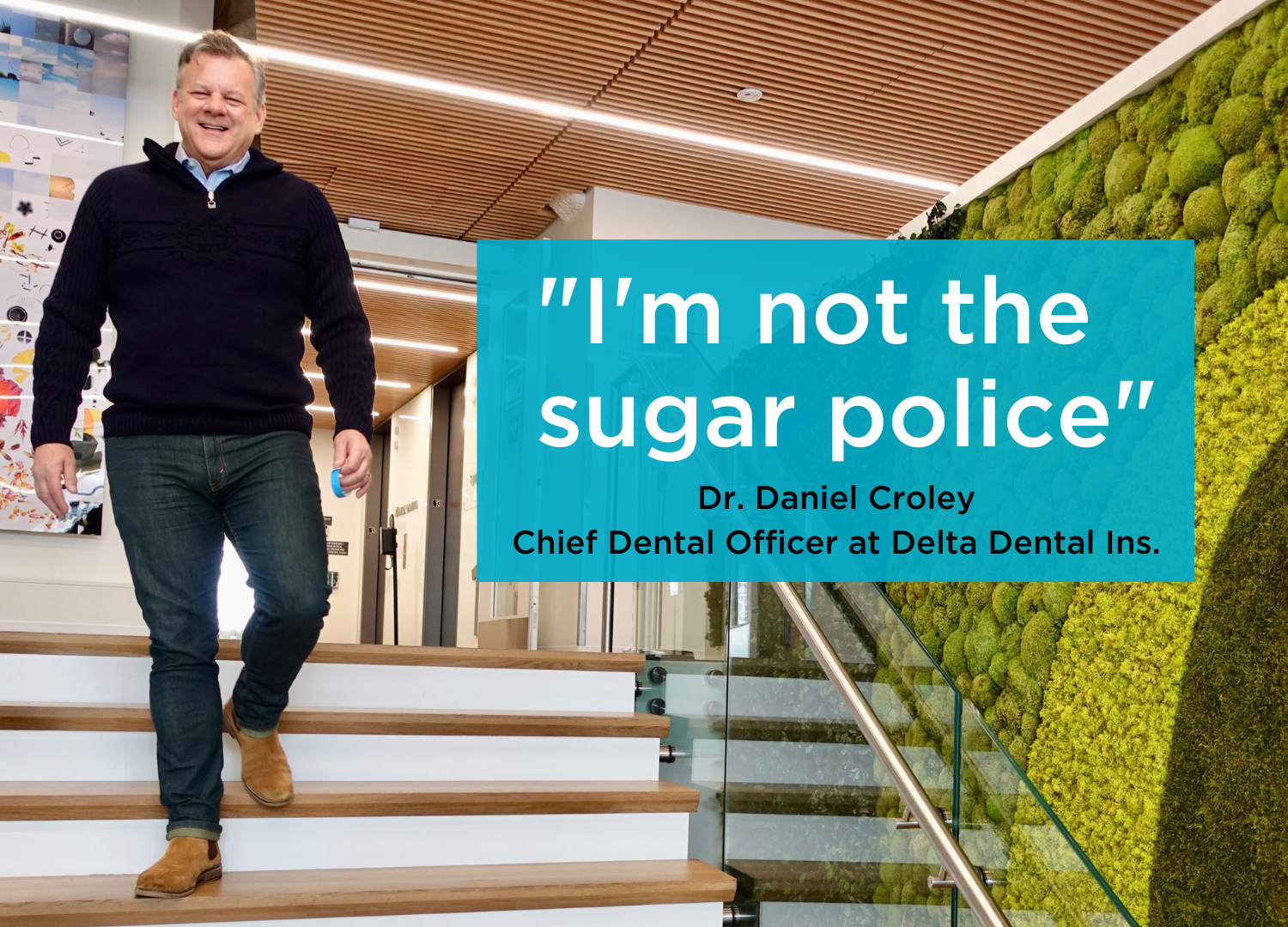"I’m not the sugar police," your friendly dentist
By: Daniel W. Croley, DMD, Chief Dental Officer at Delta Dental

When you’re a dentist you often hear things like, “I eat too much candy,” or, “I shouldn’t eat this in front of a dentist.” But the reality is that food is meant to be enjoyed and there’s no shame in eating what you like. As I like to say, “I’m not the sugar police.” Believe it or not, us dentists enjoy the occasional piece of candy, too.
We often think cavities come directly from candy or sugar when the truth is that while sugar is part of the equation, it’s not the whole formula. The goal of maintaining proper oral health is to reduce the risk of decay from starting by:
- First, understanding what creates cavities
- Second, having strategies in place to prevent them
Here is the secret cavity math that I would share with my patients:
Tooth + Food (Carbohydrate or Sugar) + Bacteria + Time = Cavity
What does this mean? Food particles that are left in the crevices of your teeth turn into decay over time. So, if you can’t brush or floss right away after eating, make sure to buy time till you can do so by drinking water or chewing sugarless gum.
If you want to have a gummy bear, Twizzler, or piece of dark chocolate, go right ahead. But don’t leave your teeth vulnerable to decay.
Why Buying Time Can Stop Decay in Its Tracks
The less time sugar—or any food for that matter—is on your teeth, the better. Just the way you clean up a spill immediately after it happens or clean your clothes when they get dirty, you need to clean your teeth when they become exposed to food and bacteria.
After eating, bacteria try to weasel their way into the crevices of our teeth and begin the equation to start the cavity. So, when you know your teeth are dirty—you just ate chocolate or had a piece of pie—you want to make sure you’re not leaving the bacteria in place to produce the acid that starts to erode the tooth away and create a cavity.
If you're not close to a bathroom or can’t brush your teeth, you might try rinsing your mouth out with water to help flush away the food (sugar or carbs) that gets stuck in the deep fissures and grooves of your teeth or in between them. This can prevent bacteria from setting up shop in your teeth.
Also, talk to your dental hygienist next time you have your teeth cleaned. Ask how you’re doing, if you’re cleaning your back teeth properly, or ask about any tips that could help. They can offer all sorts of oral hygiene tricks you may not know.
With Kids, Start Oral Health Care Early On
For children, one strategy is dental sealants because most tooth decay sets up in the pits and fissures or grooves of the chewing surface of their back teeth. Sealants fill in those deep grooves and coat them with a clear protectant to block those areas from getting bacteria in them.
Kids should also drink fluoridated water since it strengthens tooth enamel, helps harden teeth, and wards off tooth decay. Plus, kids should brush and floss twice daily, and parents should set a good example for them. Your kids are more likely to stick with good oral hygiene habits if you do too.
Most importantly, let your kids form a healthy relationship with their dentist. Don’t instill your anxiety on them, and don’t tell them they can’t have a piece of candy because their dentist will find cavities in their teeth. We want kids to enjoy the foods they like, but to also be equipped with the right oral care habits.
The bottom line is that you can have sugar in moderation. As long as you know the formula that causes cavities and maintain good strategies to prevent tooth decay, you can have good oral hygiene—and enjoy a little candy, too. Remember, “we’re not the sugar police,” we’re here to help make sure you have a lifetime of healthy teeth and happy smiles.
Daniel W. Croley, DMD, earned his BS and DMD degrees from the University of Kentucky and a GPR at the Veterans Administration Hospital in Louisville. After leaving private dental practice, Dr. Croley held several positions leading dental networks and informatics. Currently as Chief Dental Officer, he sets strategic policy and direction and oversees the patient-centered approach to quality dental care delivery for Delta Dental of California, Delta Dental Insurance Company, Delta Dental of Pennsylvania and New York, and their affiliated companies.